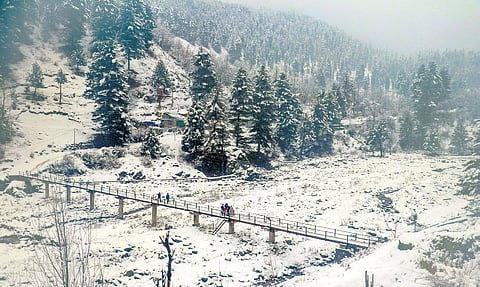

SRINAGAR: Jammu and Kashmir summer capital Srinagar has recorded the driest Chilai Kalan (40-day harshest winter period) when there are maximum chances of rain and snowfall this winter in the last 60 years.
According to the Meteorological department official, Srinagar recorded only 1.5 mm precipitation during Chilai Kalan this winter. The Chilai Kalan started on December 21 and ends on January 30. “The previous driest January was recorded in 1966, when only 0.6 mm precipitation was recorded,” the MeT official said.
This Chilai Kalan, Kashmir witnessed uncharacteristic dry weather. There has been no snow in the plains including Srinagar while the upper reaches including famous tourist resorts of Gulmarg in north Kashmir, Pahalgam in south Kashmir and Sonamarg in central Kashmir have witnessed very little snowfall and that too at the fag end of the Chilai Kalan. No snowfall in plains including Srinagar this time has disappointed the locals.
A retired school teacher Abdul Rashid said the snowfall in ‘Chilai Kalan’ is very important and crucial for the Valley.
“The snow during the ‘Chilai Kalan’ remains frozen and provides water supply to the water bodies during the summers. The snowfall causes temporary disturbances in daily life but in the long run, it is in interest and benefits the people,” he said. Rashid rued that unfortunately there has been very less snowfall in upper reaches while the plains did not experience any snowfall this winter.
“It will definitely have a bearing on our water supply, electricity and agriculture and horticulture produce this year,” he said.
Meteorological department Kashmir Mukhtar Ahmed attributed continued dry spell and no active Western Disturbance for the driest Chilai Kalan in Srinagar. “This year feeble Western Disturbances were also very low”. He attributed the lengthy dry spell and reduced snowfall to the El-Nino effect, a periodic sequence of climatic changes that impact parts of the Pacific region.
“The El-Nino effect still persists in J&K. Besides, there may also be other factors for the driest January,” Mukhtar said.
‘Last driest Jan in ’96’
Meteorological department official says Srinagar recorded only 1.5 mm precipitation in Chilai Kalan this winter. “The last driest January was recorded in 1966. 0.6 mm precipitation was recorded,”